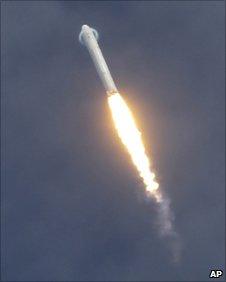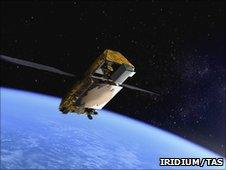Next-generation Iridium to launch on SpaceX Falcon 9
- Published

The developers of the Falcon 9 want to launch astronauts as well
The Iridium sat-phone company will use the Falcon 9 rocket to launch many of its replacement spacecraft.
The US firm recently announced a $2.9bn project to upgrade its network of 66 operational satellites from 2015.
It has now contracted the fledgling SpaceX corporation and its brand new Falcon vehicle to put the Iridium Next constellation in orbit.
The rocket has only just made its maiden flight, completing a flawless ascent to orbit on 4 June.
Wednesday's deal is valued at $492m, making it one of the largest commercial launch contracts ever signed.
The Iridium Next project itself is probably the world's biggest private space venture right now.
The Falcon could loft several satellites at once and a special mechanism to dispense multiple payloads would be developed for the task, an Iridium spokesperson told BBC News.
The Virginia-based mobile satellite services company says it expects to engage at least one additional rocket company.
Iridium has about 360,000 subscribers worldwide who use its network of satellites to make calls and send data. The US government is a major customer.

The Iridium Next constellation will go into orbit from 2015
The Iridium constellation operates in a low-Earth orbit about 780km above the planet. The spacecraft are aligned in six planes and relay communications between themselves and ground stations to provide global coverage.
The Iridium Next project intends to replace these assets between 2015 and 2017. The Franco-Italian manufacturer Thales Alenia Space (TAS) will build 81 spacecraft for the purpose.
The Falcon 9 has been developed by internet entrepreneur Elon Musk as a low-cost medium-to-heavy-lift vehicle capable of taking cargo and astronauts to the International Space Station (ISS).
Mr Musk's California-based SpaceX company already has a $1.6bn contract with Nasa to service the ISS with food and spare equipment.
But Mr Musk also has his sights set on the commercial satellite launch market, and is currently advertising prices to launch telecommunications spacecraft that dramatically undercut those of established rocket operators.
The Iridium Next satellites will probably go into space from the Falcon pad being developed at Vandenberg Air Force Base.
Iridium's competitors are not standing still, either. The California-based Globalstar company will launch the first of its next-generation spacecraft later this year. These satellites are also being built by TAS.
And UK-based Inmarsat showed off its new handset this week. Inmarsat hopes the high-specification, competitively priced IsatPhone Pro device will prove very attractive to users.
- Published4 June 2010
- Published2 June 2010